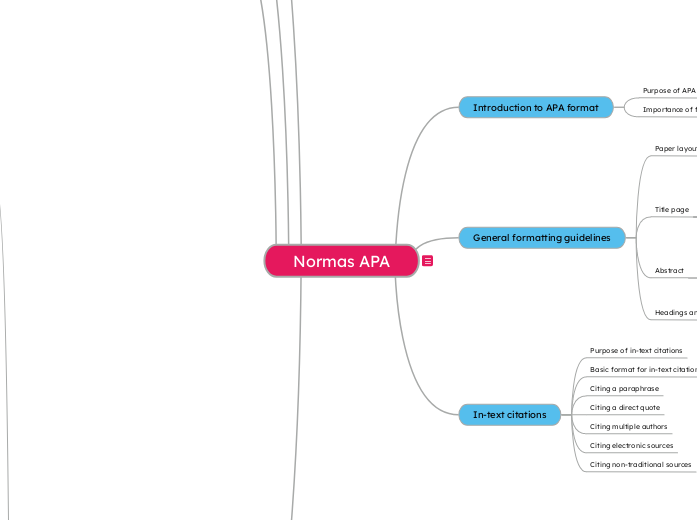Normas APA
Introduction to APA format
Purpose of APA format
Importance of following APA guidelines
General formatting guidelines
Paper layout
Margins
Font and font size
Title page
Title of the paper
Author's name and affiliation
Running head
Page number
Abstract
Purpose and content
Word count
Headings and subheadings
Levels of headings
Formatting for each level
In-text citations
Purpose of in-text citations
Basic format for in-text citations
Citing a paraphrase
Citing a direct quote
Citing multiple authors
Citing electronic sources
Citing non-traditional sources
Reference list
Purpose of the reference list
Formatting guidelines for the reference list
Order of entries
Formatting for different types of sources
Examples of reference list entries
Avoiding plagiarism
Definition of plagiarism
Importance of avoiding plagiarism
Strategies for avoiding plagiarism
Properly citing sources
Paraphrasing and summarizing
Using quotation marks
Conclusion
Note: The following breakdown provides additional details for each section and subsection
General formatting guidelines
Paper layout
Margins
The paper should have 1-inch margins on all sides
Font and font size
Times New Roman
12-point font should be used throughout the paper
Title page
Title of the paper
The title should be centered on the page and written in title case
Author's name and affiliation
The author's name should be centered below the title
followed by the author's affiliation
Running head
The running head is a shortened version of the paper's title and should be included on each page
aligned to the left margin
Page number
The page number should be aligned to the right margin on each page
Abstract
Purpose and content
The abstract provides a brief summary of the paper's main points and should be between 150-250 words
Word count
The word count of the abstract should be included at the bottom
right after the abstract text
Headings and subheadings
Levels of headings
APA format uses five levels of headings
ranging from level 1 (main section) to level 5 (subsections within subsections)
Formatting for each level
Each level of heading has its own formatting rules
including font size
bolding
and indentation
In-text citations
Purpose of in-text citations
In-text citations are used to give credit to the original source of information and to allow readers to locate the source in the reference list
Basic format for in-text citations
In APA format
in-text citations include the author's last name and the year of publication
enclosed in parentheses
Citing a paraphrase
When paraphrasing information from a source
the author's last name and year of publication should be included
Citing a direct quote
When including a direct quote
the author's last name
year of publication
and page number should be provided
Citing multiple authors
For sources with multiple authors
all the authors' last names should be listed the first time the source is cited
For subsequent citations
only the first author's last name followed by "et al." should be used
Citing electronic sources
Electronic sources should include the author's last name or the organization's name
the year of publication
and the specific URL or DOI
Citing non-traditional sources
Non-traditional sources
such as interviews or personal communications
should include the name of the person interviewed and the date of the communication
Reference list
Purpose of the reference list
The reference list provides detailed information about the sources cited in the paper
allowing readers to locate and verify the information
Formatting guidelines for the reference list
Order of entries
Entries in the reference list should be arranged in alphabetical order by the author's last name
Formatting for different types of sources
Different types of sources
such as books
journal articles
and websites
have specific formatting rules for the reference list
Examples of reference list entries
Examples of correctly formatted reference list entries should be provided for various types of sources
including books
journal articles
and online sources
Avoiding plagiarism
Definition of plagiarism
Plagiarism is the act of presenting someone else's work or ideas as your own without giving proper credit
Importance of avoiding plagiarism
Plagiarism is a serious ethical violation and can lead to academic consequences
Strategies for avoiding plagiarism
Properly citing sources
Accurately and consistently citing sources throughout the paper is crucial to avoid plagiarism
Paraphrasing and summarizing
Paraphrasing and summarizing information from sources in your own words while still giving credit is an effective way to avoid plagiarism
Using quotation marks
When directly quoting from a source
using quotation marks around the exact words is necessary to avoid plagiarism
